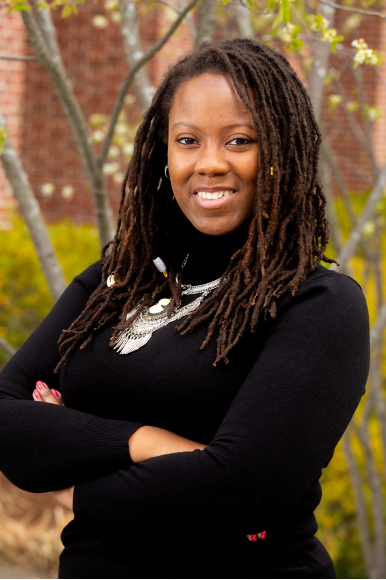Allison Guess graduated in April 2021 with a PhD in Earth and Environmental Sciences. Allison’s research focuses on Black people’s relationships to land in the Americas, and the emergence of “Black Land.” At the Futures Initiative, Allison edited the newsletter and took a leading role in organizing FI events. She says that her work in this capacity is an example of how FI supports its graduate students by demystifying institutional operations by providing important insights on how to navigate the academy. Currently, Allison is in a tenure-track position at Williams College. In the future, she hopes to publish her dissertation as a book.

Dr. Guess’s full interview can be read below.
Q: What was your PhD program?
A: Earth and Environmental Sciences (EES), Graduate Center, CUNY.
Q: Research focus?
A: My research focuses on Black people’s relationships to land in the Americas and the emergence of “Black Land.” To zero in on some of these grounding relationships, I focus particularly on the island of Hispaniola (late 15th and 16th centuries) to understand these initial Black relationships to land in the early modern Americas as they materialize and culminate through the 1521 Christmas Rebellion—the earliest documented, large-scale rebellion to take place in Hispaniola and arguably the Americas. Thus, in studying Black people’s relationships to land, I have come to center Black and Black-led rebellion, and Black productions of place, within settler racial capitalist contexts. More specifically, I focus on how Black people (collectively)—despite differentiated ethnicities and subject positions—oppose capitalist extraction, and the commodification of land, its resources, and Black or Blackened peoples, and simultaneously make space to practice and enact oppositional socioecological and political visions.
Q: Preferred Pronouns?
A: She/Her/They/We
Q: Year of graduation?
A: April 2021
Q: Year(s) affiliated with FI?
A: 2015-2018
Q: Favorite FI memory?
A: I would have to say either writing one of my earlier blogs/recaps, particularly “A World Void of Our Critical Actions: Without the Humanities,” as I had no idea how to write a recap at this early stage of being a working-class Black woman doctoral student. Because I wasn’t very familiar with the genre of recapping, I did the best that I could. I wrote what made sense to me at the time. While it felt a little daring at this phase, I took a leap of faith, as I was also not accustomed to public writing. Another favorite memory was planning and producing the event, “Global Perspectives on the Fight for Higher Education.” I remember this event being quite stressful to organize, but I think it turned out great. Cathy Davidson once reminded me that this event happened online, in Eastern Standard Time, and simultaneously in the U.S., Canada, and South Africa—three countries.
Q: How did FI contribute to your academic/professional goals?
A: FI helped me—someone previously who thought of themselves as both unlikely and accidentally ending up in the academy—to become more comfortable expressing myself as a public intellectual. FI served as a platform for me to speak and write publicly and demonstrate my planning abilities. I am grateful for this every day.
Q: How would you describe the ways in which FI provides support for graduate students?
A: One way FI supports graduate students is by demystifying institutional operations. While a Fellow at FI, I came to know how to plan events, which gave me insight on how to navigate the institution. I was able to build relationships across the alleged student/faculty/staff distinctions. This is something that I do not assume many people who are neither student activists nor involved in these kinds of networks would necessarily learn if not operating in one of these capacities. In other words, FI supported a graduate student like me who although was quite active, did not really know much about academia and academic institutions, as I wouldn’t have previously imagined that I would ever be involved, yet alone earn any kind of graduate degree, especially a Ph.D.
Q: Current career? What do you want to do in the future?
A: Currently I am an Assistant Professor of Africana Studies at Williams College. In the future, I’d love to finish revising and publishing my dissertation into a book. I also dream of writing a two-woman play derived from some of the insights that I garnered through the study of the 1521 Santo Domingo Rebellion. Additionally, I dream of co-screenwriting a series based on my research of Black life on the island of Hispaniola in the 15th and 16th centuries. I also want to steward a Black and Indigenous Land University and Space in the future.
Q: What post-FI accomplishment are you most proud of?
A: I am proud of many things, but in chronological order, I was honored to be selected as an IUPLR Mellon Dissertation fellow during my final year at the Graduate Center. I am immensely blessed to have earned a tenure-track position as Assistant Professor of Africana Studies at Williams College. I was thrilled to be a CUNY Dominican Studies Institute Fellow, last year in 2021.
Q: Anything else you’d like to share about FI?
A: I am grateful to have been one of the initial FI Fellows. It was a rewarding experience.






